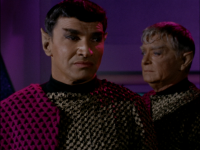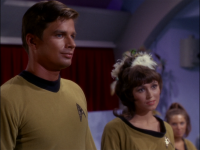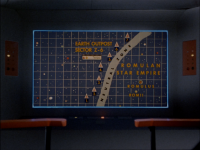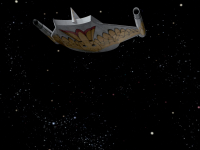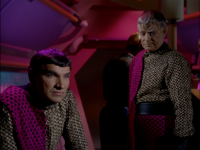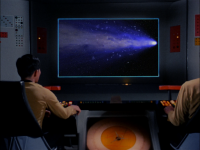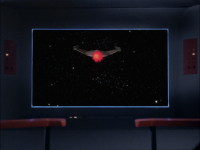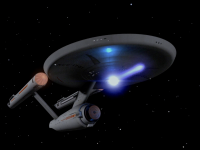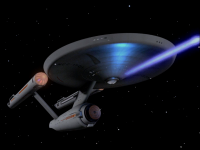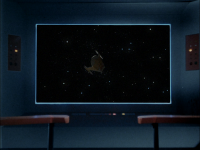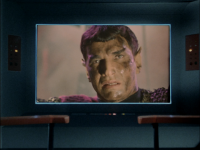Star Trek: The Original Series — 1x14 — Balance of Terror
Synopsis
After attacking an outpost, Romulans battle the Enterprise.
Filler rating: not filler
This is the first episode to feature the iconic Romulan Empire and is easily the best episode of all of TOS. If you watch only one episode of Star Trek TOS, let it be this one.
Remarkable scenes
- The wedding interrupted at the beginning.
- Spock explaining the map of the Neutral Zone.
- Stiles describing an ancester of his: a ship captain who died fighting Romulans during the Earth-Romulan war.
- The Romulan ship destroying another Earth outpost before the Enterprise's eyes.
- Kirk chastising Stiles for questioning Spock's loyalties.
- The external closeup shot of the Romulan ship.
- The Romulan commander: "Another war. Must it always be so? How many comrades have we lost in this way? Obedience. Duty. Death, and more death..."
- Spock: "I agree. Attack." I love that line because that was the last thing everyone was expecting him to stay given the newly discovered connection between the Romulans and the Vulcans.
- The battle at the comet.
- The Enterprise outrunning the plasma torpedo.
- The Romulans evading the Enterprise by dumping debris and running.
- McCoy: "In this galaxy there's a mathematical probability of three million Earth type planets. And in all of the universe, three million million galaxies like this. And in all of that, and perhaps more, only one of each of us."
- The Romulans planting a nuclear warhead in the debris.
- Spock dealing the finishing blow to the Romulan ship.
- The Romulan commander's discussion with Kirk at the end.
Review
Meet: the Romulan Empire. This episode is quite clearly a 23rd century Cold War allegory in which Earth is the United States and the Romulan Empire is the Soviet Union. You might not think that to be a terribly original premise given how much fiction is out there satirizing the Cold War, but the devil is in the details which are strikingly original and fascinating in their implications. During this episode, Spock reveals that Earth fought an interstellar war with the Romulan Star Empire a hundred years ago during the 22nd century. This conflict ended with some kind of stalemate which resulted in a neutral, demilitarized zone of space created to serve as a buffer between the two nations. Since that time there has been absolutely no contact between them. As the title of the episode implies, such a political situation is a terrifying prospect. Imagine a powerful, reclusive nation sitting just on the other side of your border, ready to strike at any moment!
The Romulan Empire chose this moment to strike. This episode doesn't go into the implications of what Earth's political response will be to this blatant attack on its sovereignty as there wasn't enough time, but given the seeming importance of the events of this episode there are without a doubt more stories to be told about the Romulans. Like the political conflict, the revelation that the Romulan species is genetically related to the Vulcans is intriguing, as are Spock's comments about his people's volatile past. The Romulan Empire can thus be seen as a road not taken by the Vulcans. The Romulans are what the Vulcans might have become like had they not embraced logic and emotional detachment at the core of their philosophy. Given that, it's understandable why Spock would urge so diligently to destroy the intruder as he has a deep understanding of the threat they represent. This level of conviction adds new dimensions to both Spock and his people while cultivating a deeper, more interesting and nuanced antagonist at the same time.
While the episode does an excellent job deepening the Romulans through Spock, the plotting also gives them a great deal of time to shine on their own. The frequent cuts to the bridge of the Romulan vessel were an excellent choice on a number of levels. On the surface we get the delightful opportunity to see a space battle from both sides. But moving beyond that simple pleasure, framing the story in this way allows us to get to know the antagonists personally. We get to see them in their element and in their context. In a certain sense the story treats both sides of the battle as protagonists. In this story the tragedy isn't the traditional, expected suffering of the good guys at the hands of the bad guys, the tragedy is the conflict itself. By cultivating Romulan characters who are deep, sympathetic, and nuanced, their deaths at the end of the story are as tragic as the death of the crewman who was to be wed.
This is the sort of stuff the finest dramas are made of. This is without a doubt the best episode of Star Trek so far.
